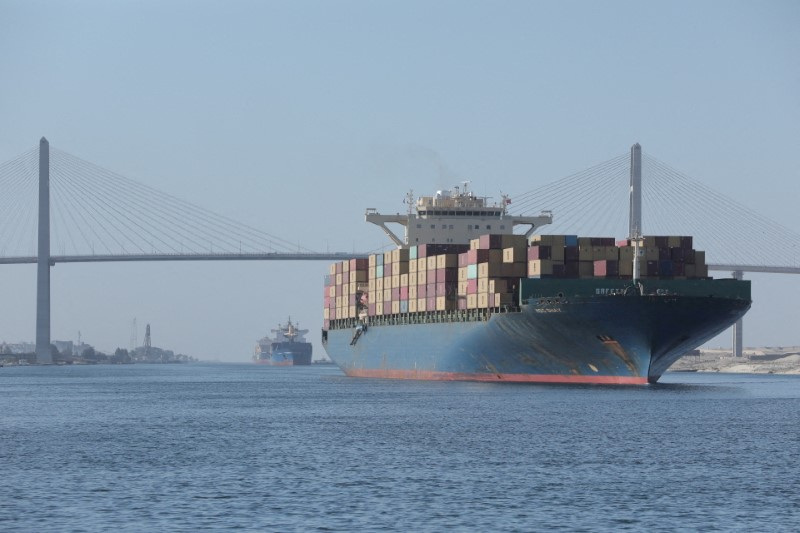By Angelo Amante and Elisa Anzolin
ROME/MILAN (Reuters) - Houthi attacks on Red Sea shipping are causing major disruption to Italian ports, operators say, fuelling fears that a prolonged crisis may force companies to redraw routes and move traffic away from the Mediterranean more permanently.
The Iran-aligned Houthi group has been targeting vessels in the region since November, impacting commerce on a route that accounts for as much as 15% of the world's shipping traffic. The Houthis say they are acting in solidarity with Palestinians during Israel's war with militant group Hamas in Gaza.
Italy has in recent years taken advantage of its position at the centre of the Mediterranean to grab a share of sea traffic coming from the Suez Canal and destined for markets in Europe.
Data from think tank SRM shows some 40% of Italy's international maritime trade relies on that route, amounting to roughly 154 billion euros ($168 billion) in 2022.
In response to the Houthi attacks some shipping companies have instructed vessels to take a slower and more expensive route around southern Africa.
Operators say sailing around the Cape of Good Hope, which adds 10 to 15 days to the trip, could make it more convenient for ships to head directly to Northern Europe, bypassing the central Mediterranean.
"Our fear is that ... our German, Austrian, Hungarian customers that we wooed away from the Northern European ports in the past years will return there," said Zeno D'Agostino, head of Trieste's port authority. Container ship arrivals from Asia to the eastern Italian city have been delayed by the crisis.
D'Agostino said some exporters, particularly of higher-value goods, were considering transportation to Asia by rail, which takes roughly half the time but is more expensive.
PERFECT STORM
"It feels like a perfect storm," Rodolfo Giampieri, head of industry group Assoporti, told Reuters, saying the Houthi attacks came as the Mediterranean was becoming more central to world trade.
Giampieri said much would depend on how long the crisis lasts, but that it is likely to raise costs for companies and drive up prices of materials being shipped.
Imports from Asia are critical to many Italian businesses and there are mounting worries that the Red Sea crisis could affect activity across the country.
In the northwestern city of Genoa, four container ships did not arrive as scheduled last month and port authorities fear congestion if too many boats want to dock at the same time.
Shipping agents estimate ground transport in Genoa has decreased by up to 30% in recent weeks.
"The escalation (in the Middle East) does not seem to be getting to a solution so we, as logistics operators but also industry, probably will have to rethink supply cycles," said Giampaolo Botta, director general of Genoa's shipping agents association.
He said industries could face procurement issues in late February and early March, and might need to stock up on goods to make sure they have enough for their needs.
Antonio Majocchi, an international business professor at Luiss University in Rome, said sectors including computers, automotive and semiconductors were likely to be hit hardest if the crisis is prolonged.
He told Reuters the Red Sea turbulence may push businesses to buy what they need from markets closer to home, even if that meant higher prices. A trend towards "near-shoring" has already begun as a response to supply chain issues during the pandemic.

"(The crisis) accelerated a process that was already underway: the regionalisation of value chains .... Everyone in Italy is thinking about doing this, reducing this distance," Majocchi said.
($1 = 0.9187 euros)